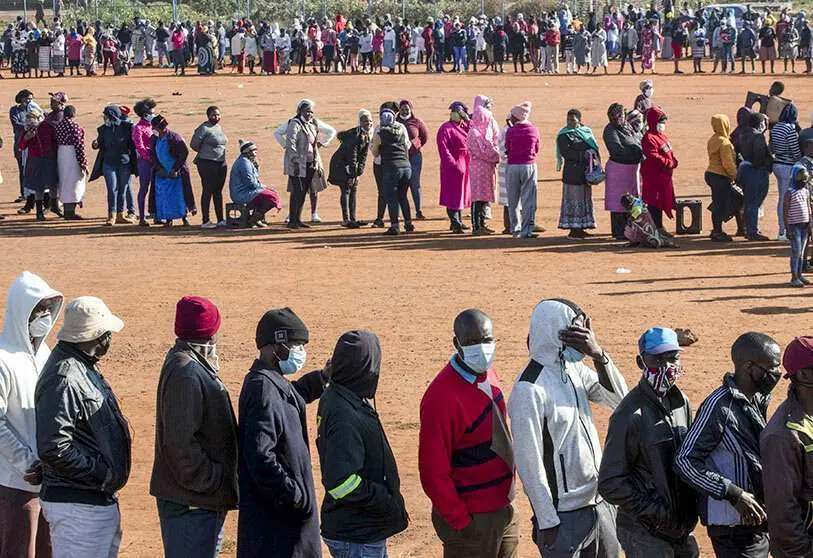COVID-19 has not devastated Africa to the surprise of many, why?

When it was already clear that COVID-19 would be a global pandemic, public health experts warned of the devastating effect it would have on Africa, a forecast that has not materialised and that many scientists are still trying to explain.
"It's not that people believe that the coronavirus doesn't exist, but they talk among themselves: 'do you know anyone who has passed it on', 'do you know anyone who is infected', and the answer is always no," Daniel Murkuru (not his real name) told Efe about the perception of this pandemic in his community, Kibera, one of Nairobi's largest suburbs.
Unlike in Europe or America, where the spread of the coronavirus is picking up or remains out of control, infections seem to have slowed down in Africa.
The African continent has just over 1.4 million cases -less than five percent of the world total and almost half in South Africa-about 34,000 deaths and just over a million cures out of a total population of 1.3 billion.
At first, the great conundrum behind these relatively low figures was attributed to the shortage of screening tests, with only three countries - South Africa, Morocco and Ethiopia - in which more than half a million tests have been carried out, and only 16 where more than 100,000 tests have been done.
As of last week, 13.6 million tests had been confirmed across the continent, according to data from the Centers for Disease Control and Prevention (CDC Africa).
"The tests are the cornerstone of the response to this pandemic, without the tests we will be fighting blind," acknowledged CDC Africa Director John Nkengasong last week.
"We need to expand the tests and we must improve the response time of the tests so that we can quickly identify, isolate and treat positive cases," said Nkengasong, who has praised the early and drastic containment measures that African governments took against the coronavirus after the first continental infection was detected on February 14 in Egypt.
At the beginning of the health crisis, the opacity of some governments was also highlighted, such as those of Eritrea and Tanzania-with 364 and 509 confirmed official cases, respectively-where restrictions on freedoms and lack of information prevent accurate knowledge of how the pandemic is evolving within their borders.
"The risk of contracting COVID-19 in Dar es Salaam, Tanzania's most populous city, is extremely high. Despite limited official reports, all the evidence points to an exponential growth of the epidemic," warned the US Embassy in this country, which reported the existence of "overcrowded hospitals".
However, in addition to these two hypotheses (lack of evidence and lack of information), together with the lower level of air traffic in Africa compared to the West, new scientific theories have been added that attempt to provide an initial response as to why the coronavirus has not struck so deadly in these developing countries.
"South Africa is doing well, and it is certainly fortunate for us that the kind of projections envisaged by the modelers have not materialised," confirms the principal investigator of the VIDA 19 vaccine trial at the University of Wits (South Africa), Shabir Madhi, on the African nation most affected by the virus.
In his view, and as previous research - including a study conducted by Oxford University (UK) in July - had already pointed out, this could be due to the 'cross immunity' of a large percentage of the population, previously exposed to other, milder, seasonal strains of coronavirus that cause coughs and colds.
"This could possibly explain why, despite the fact that a relatively high percentage of the population has been infected, our health facilities have not collapsed and the number of deaths projected has not been reached," Madhi continues, in statements to South African Radio 702.

According to scientific studies, there are four types of coronavirus that infect humans regularly: NL63, 229E, OC43 and HKU1; the fifth, known as SARS-CoV-2, is the one that causes COVID-19.
If a person has already been infected with one of these viruses - more common in crowded, poverty-stricken neighbourhoods - his or her body may develop some immunity to the other coronaviruses, making his or her SARS-CoV-2 infection less serious and less deadly.
On 15 September, the South African Ministry of Health estimated, pending the full results of national seroprevalence studies, that the actual number of infections in the country would be around 12 million - about 20 percent of the population - although official data amounted to 650,749 infections.
If these estimates are confirmed, and despite the fact that the actual number of deaths is also estimated to be at least 2.5 times the almost 16,000 reported, this would once again demonstrate a less deadly pandemic with a greater number of asymptomatic people.
In turn, lower life expectancy and a much younger population than Europe or the United States-with an average age on the African continent of some 19 years-have also had an influence, according to public health experts, on fewer vulnerable people being hospitalised or dying as a result of this new virus.
"In my projections, I believe that the second wave will be less severe than the current one", Madhi states, warning that very probably, like the other coronaviruses, COVID-19 will remain among us as a "seasonal nuisance".








